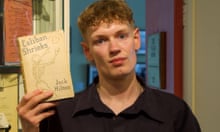The author Elif Shafak has said she thinks “there’s a scream building up” inside many young people, because they feel their future “is being shaped by older generations”.
“It’s difficult to be young, in this age in particular,” the Turkish-British novelist told the Hay festival. “It’s their future that’s been broken by previous generations,” she said, citing Brexit and the climate emergency.
She also spoke of the “widening inequalities” that the pandemic has exacerbated and said that it was women, minorities and young people who suffer the consequences disproportionately. Because young people are less likely than their older counterparts to be in stable financial positions there was “a very existential angst” among them, she said.
The idea that young people “want to scream at us” is one that Shafak explores in her most recent novel, The Island of Missing Trees, which was shortlisted for the Women’s prize. In the book 16-year-old Ada, who lives in London with a father who rarely shares his wartime memories of his native Cyprus, begins to scream in the middle of a history lesson. Shafak, 50, said she was interested in the idea that growing up “in a family of silences” might be carrying frustration that needs to be let out.
Things are much harder for teenagers, she said, but also noted that the amount of abuse women and minorities of all ages receive online is rising “and we do nothing to deal with it”. It’s very easy to feel lonely as result, she said.
It was ironic, she said, because the advent of social media promised an equal voice for everyone. “What happened in reality was that in the midst of this cacophony of voices, we’ve been voiceless … you speak louder and louder but you still aren’t heard”, which is “extremely exhausting”.
Shafak described the time we’re living in as “an age of anxiety”, but said “it would be a much darker world to live in if it turned into an age of apathy” and we stopped caring about one another. Literature was more vital than ever because it was “the antidote to apathy”, she said.










